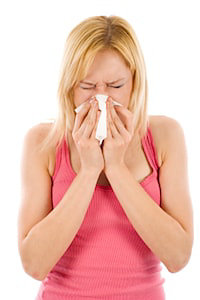5 Proven Allergy-Season Survival Tips

March 24, 2014
If you have seasonal allergies, your Spring is usually spent sniffling, sneezing and wiping a runny nose that won’t stop.
While there’s no escaping allergies, there are plenty of things you can do to keep the pollen away and minimize annoying allergy symptoms.
Here are 5 proven ways to do that.
1) Avoid being outside when when pollen count is high
Pollen count measures how much pollen is in the air. High pollen count=more exposure to pollen that will agitate your allergies.
So, how do you know when the pollen count is high?
According to the National Institute of Allergy and Infectious Diseases, “Pollen counts tend to be the highest early in the morning on warm, dry, breezy days and the lowest during chilly, wet periods.”
Also, some days are just worse than others. Use the Weather Channel’s PollenCast to get a 4-day forecast of pollen count levels. Use this to see when an outdoor activity may not be the best idea.
Sign up for Weather Channel’s PollenCast to get alerts sent to your email inbox.
2) Use an pollen mask for outside activities
Do you dread cutting your grass? Don’t blame you. As soon as you start, pollen that has settled on the ground will be go everywhere. You’ll be a sniffling mess by the time you finish.
Wear a quality pollen mask so you won’t breathe in the pollen. Your nose will thank you.
Alongside a mask you should...
3) Wear sunglasses
Tired of teary eyes? Sport your sunglasses wherever you go to keep pollen from weeds, trees and grasses away from your eyes.
4) Don’t let pollen make itself at home
You would think closing your windows would be enough. But pollen sneaks into your home in multiple ways:
- Pets: Pollen stick to your pets' fur. So make sure you wipe them down when they come inside. Don’t wait or they might get in your bed—the last place you want pollen to live.
- Shoes: Don’t track in pollen on your carpets. Leave your shoes at the door.
- Hair: Either wear a hat or make sure you shower at night rather than in the morning.
- Clothes: Change your clothes when you get home so you’re not just sitting around with pollen-covered clothes. Also, don’t dry clothes on an outdoor line where pollen can get all over your clothes. Use your dryer instead.
5) Get a HEPA filter
HEPA stands for high-efficiency particulate air. A HEPA filter is a type of mechanical air filter that forces your home’s air through a fine mesh to trap particles that can aggravate your allergies, including:
- Pollen
- Pet dander
- Dust mites
- Tobacco smoke
A HEPA filter is also called a whole-house air cleaner since it cleans all the air that comes through your home’s return vents (the places where air returns so your heating/cooling system can recirculate it back into your home).
Let’s compare this to a regular fiberglass air filter for a second.
A regular air filter is design to protect heating/cooling system from larger airborne particles. A HEPA filter is designed to protect you from smaller particles (like pollen).
Want to learn more about whole-house air cleaners? Ask our experts for help.
Cool Today provides award-winning air quality improvement service to Sarasota, Florida and the surrounding areas like Bradenton, Tampa and Port Charlotte.
Posted in: Tips